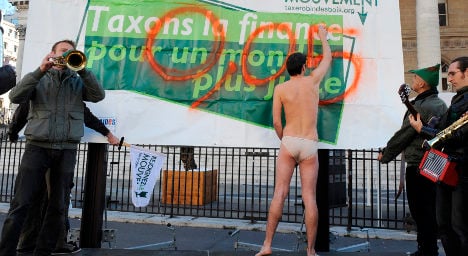In an interview on France Inter radio Hollande said such a tax should be put in place next year in willing European countries on "all financial products at a low rate".
That is a shift of position for France, whose insistence that financial derivatives products important for French banks be excluded from the products to be taxed led to the failure of talks last month between 11 EU states that was supposed to finalise the initiative.
The European Commission, the EU's powerful executive arm, as well as Germany and France proposed a tax on financial transactions in the wake of public anger in 2011 against bank traders who were blamed for the financial crisis that had sparked a global recession.
The idea was inspired by the 'Tobin Tax', named after Nobel laureate James Tobin, who proposed it in the 1970s as a means of reducing speculation in global markets and redistributing Wall Street profits to finance development in poor countries.
In the initial European version, the proceeds would go towards financing future bailouts, sparing the taxpayer from saving big banks caught out by over-speculation.
But on Monday Hollande proposed the funds raised by the tax "be used fo the environment, the fight against global warming."
Paris is to host in December a conference that aims to seal a new deal to slow climate change, building on an agreement reached last month in Peru that set in place a format for national pledges to cut emissions of Earth-warming greenhouse gases.
The financial transaction tax has been divisive.
Many EU member states, led by Britain eager to protect its City of London financial hub, have opposed the scheme.
However 11 countries including France and Germany decided to go it alone using a relatively new EU mechanism that allows some members to pursue voluntary agreements.
But as public attention turned away from the crisis, some of those countries, including France, cooled to the idea, preferring to enact a watered-down version that would be less onerous on key types of financial
trades.
France, whose economy is at a standstill, is eager to protect its lucrative derivatives trading sector, a big source of tax receipts for a French government hard-up for cash.
Germany has supported a more ambitious version, covering a wider selection of transactions.
Hollande came under pressure from his Socialist party lawmakers, who pushed for the government to return to the initial plan to tax all transactions.



 Please whitelist us to continue reading.
Please whitelist us to continue reading.
Member comments